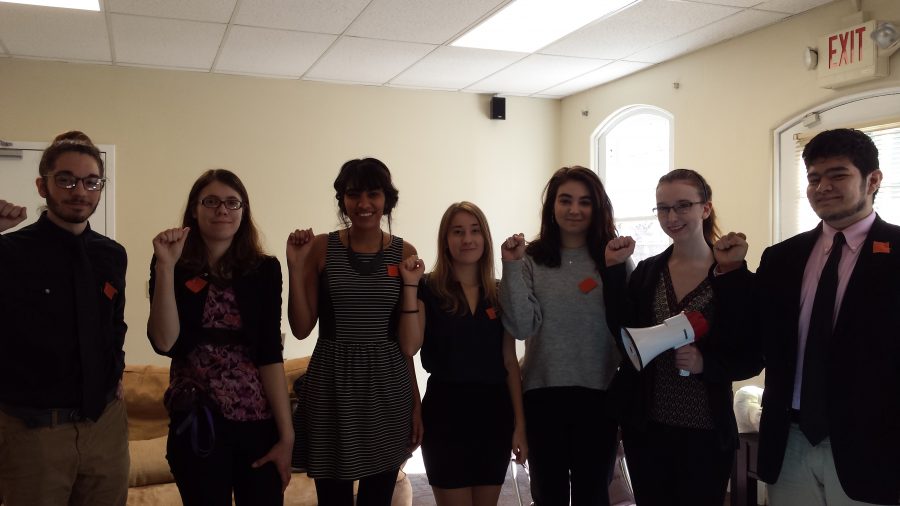Author: Claire Rhode
The Sustainable Impact Team finally met with Walter Fowler and members of Chatham’s Board of Trustees Friday February 17, for a meeting that had been rescheduled multiple times. They were discussing divesting Chatham from fossil fuels. To do this, the school would have to change its investment strategy and try to invest only in companies that do not propagate fossil fuel use.
Fowler is the vice president of finance and Chief Financial Officer (CFO), which means that he is in charge of many of Chatham’s investments. The Sustainable Impact Team met with him to show student support for divestment and to propose several reasons why divestment is the best move for a school that claims to be a major proponent of sustainability.
Half an hour before the meeting, students gathered in the courtyard of Mellon to get the message out about their meeting. They held up signs they had made, although noted the fact that their banner had gone missing sometime after they put it up the night before.
The group then moved into Mellon with support from the film crew currently working and began by singing a protest song led by Hope Sims-Medley, a senior music major. Then Tara Teets, ‘20, English and Creative Writing, told her story of growing up amidst fracking in Appalachia. “They have damaged our water supplies, ripped us from our mountains, and displaced us from our homes.”
One student, Daniel Shaffer, ’19, social work, at the protest said, “Chatham is all about sustainability, and we can’t be the most sustainable school if we’re not leading by example,” when asked why he had chosen to attend the protest.
Seven students had been preselected to actually meet with the board, Maria Duarte, ’17, psychology, Nikki Mammano, ’17, economics and political science interdisciplinary major, Maria DeCesare, ’19, psychology, Fernando Soriano, ’19, environmental science, Corey Doeing, ’20, management, Melanie Fetsko, ’19, sustainability, and Tara Teets. Dr. Hector Saez, the Sustainable Impact Team’s faculty advisor was also present. The students were surprised when they entered the meeting room and told there was only space for three people at a time, which the group decided to circumvent by standing along a wall for the hour long meeting.
Sigo Falk, Vice Chairman of the Board, spoke at the very beginning of the meeting, saying, “We actually started divesting two years ago.” He also later explained the long process of divestment, and how it was unlikely to occur in the next few years, as the school had many long term investments.
Maria Duarte began speaking shortly after, saying that Chatham, “has taught us a love of sustainability” to explain why the Sustainable Impact Team was so passionate about divesting Chatham. She also reminded the Board of the legacy of Rachel Carson, who is known for her book “Silent Spring,” which warned the public about the dangers of using pesticides over a long time. She attended Chatham in the 1920s.
Dr. David Finegold, President of Chatham University, was also in attendance and nodded along throughout most of presentation, showing his support both for his students and for the idea of divesting Chatham. He also referenced a conference he had recently attended, which was a place for presidents of sustainability focused schools to meet and discuss issues.
Fernando presented on effects of fossil fuels and the importance of divestment, saying “Be it a direct or indirect tie to these types of industry, there is a moral imperative to divest.”
The students also brought up Chatham’s Sustainability, Tracking, Assessment, and Rating System (STARS rating), which is gold at 75.19, one of the highest scores for a university. However, there is a platinum rating, which Chatham is aiming to be the second school to achieve. The students discussed how divesting would help improve the school’s STARS rating, and requested a way for students and faculty to give their input to the board during the divestment process.
After the presentation, the students stayed to discuss with the board and answer any questions they may have. “I’m all for doing that,” Dr. Finegold said, referring to divestment.
Various members of the board went on to explain that they do not directly invest, and instead use outside companies to invest for them, meaning that they have little to no control over how sustainable the investments they are making are.
“We realize that it won’t be an instantaneous process,” Soriano said in response, and went on to explain that the students still believed that the board could still find ways to invest in sustainable energy sources.
Falk countered that, saying that he believed that if they did not invest in fossil fuels, the school would have to invest in nuclear energy, because when at night or on cloudy days solar power would not be an option, and when it was windy they would be unable to use wind power. None of the students replied directly at the time, but later some expressed an interest in investing in wind and solar power to help advance those technologies. Teets also expressed interest in wind power, saying that it had helped her community in West Virginia.
The meeting ended with Maria Duarte asking for a timeline for when they would have a plan to begin divesting Chatham. She tentatively suggested the end of the semester. Dr. Finegold suggested June, as that was when the Board was next meeting and was the best time for them to vote on any proposals.
The team left the meeting to debrief in the Carriage House and suggest their next moves as they work to increase awareness of divestment on Chatham’s campus and as they wait for the board’s decision. “I’m so proud of you,” Dr. Saez said immediately as they discussed the meeting. “I’m so proud of all of you.”


